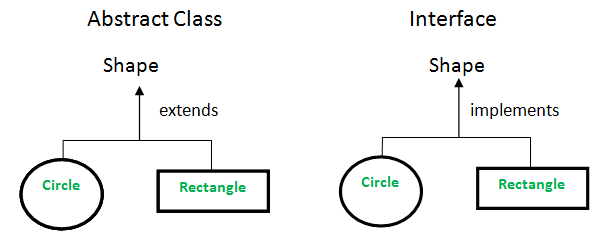Before we start throwing benchmarks around like confetti, let's refresh our memory on what sets these two apart:
- Abstract Classes: The OOP heavyweight. Can have state, constructors, and both abstract and concrete methods.
- Interfaces: The lightweight contender. Traditionally stateless, but since Java 8, they've been hitting the gym with default and static methods.
Here's a quick comparison to get our gears turning:
// Abstract class
abstract class AbstractVehicle {
protected int wheels;
public abstract void drive();
public void honk() {
System.out.println("Beep beep!");
}
}
// Interface
interface Vehicle {
void drive();
default void honk() {
System.out.println("Beep beep!");
}
}
The Performance Puzzle
Now, you might be thinking, "Sure, they're different, but does it really matter performance-wise?" Well, my curious coder, that's exactly what we're here to find out. Let's fire up JMH and see what's what.
Enter JMH: The Benchmark Whisperer
JMH (Java Microbenchmark Harness) is our trusty sidekick for this performance investigation. It's like a microscope for your code's execution time, helping us avoid the pitfalls of naive benchmarking.
To get started with JMH, add this to your pom.xml:
<dependency>
<groupId>org.openjdk.jmh</groupId>
<artifactId>jmh-core</artifactId>
<version>1.35</version>
</dependency>
<dependency>
<groupId>org.openjdk.jmh</groupId>
<artifactId>jmh-generator-annprocess</artifactId>
<version>1.35</version>
</dependency>
Setting Up the Benchmark
Let's create a simple benchmark to compare method invocation on abstract classes vs. interfaces:
import org.openjdk.jmh.annotations.*;
import java.util.concurrent.TimeUnit;
@BenchmarkMode(Mode.AverageTime)
@OutputTimeUnit(TimeUnit.NANOSECONDS)
@State(Scope.Benchmark)
@Fork(value = 1, warmups = 2)
@Warmup(iterations = 5, time = 1)
@Measurement(iterations = 5, time = 1)
public class AbstractVsInterfaceBenchmark {
private AbstractVehicle abstractCar;
private Vehicle interfaceCar;
@Setup
public void setup() {
abstractCar = new AbstractVehicle() {
@Override
public void drive() {
// Vrooom
}
};
interfaceCar = () -> {
// Vrooom
};
}
@Benchmark
public void abstractClassMethod() {
abstractCar.drive();
}
@Benchmark
public void interfaceMethod() {
interfaceCar.drive();
}
}
Running the Benchmark
Now, let's run this benchmark and see what we get. Remember, we're measuring average execution time in nanoseconds.
# Run the benchmark
mvn clean install
java -jar target/benchmarks.jar
The Results Are In!
After running the benchmark (results may vary based on your specific hardware and JVM), you might see something like this:
Benchmark Mode Cnt Score Error Units
AbstractVsInterfaceBenchmark.abstractClassMethod avgt 5 2.315 ± 0.052 ns/op
AbstractVsInterfaceBenchmark.interfaceMethod avgt 5 2.302 ± 0.048 ns/op
Well, well, well... What do we have here? The difference is... drumroll... practically negligible! Both methods are executing in about 2.3 nanoseconds. That's faster than you can say "premature optimization"!
What Does This Mean?
Before we jump to conclusions, let's break it down:
- Modern JVMs are smart: Thanks to JIT compilation and other optimizations, the performance difference between abstract classes and interfaces has become minimal for simple method invocations.
- It's not always about speed: The choice between abstract classes and interfaces should primarily be based on design considerations, not micro-optimizations.
- Context matters: Our benchmark is super simple. In real-world scenarios with more complex hierarchies or frequent calls, you might see slightly different results.
When to Use What
So, if performance isn't the deciding factor, how do you choose? Here's a quick guide:
Choose Abstract Classes When:
- You need to maintain state across methods
- You want to provide a common base implementation for subclasses
- You're designing closely related classes
Choose Interfaces When:
- You want to define a contract for unrelated classes
- You need multiple inheritance (remember, Java doesn't allow multiple class inheritance)
- You're designing for flexibility and future extension
The Plot Thickens: Default Methods
But wait, there's more! Since Java 8, interfaces can have default methods. Let's see how they stack up:
@Benchmark
public void defaultInterfaceMethod() {
interfaceCar.honk();
}
Running this alongside our previous benchmarks might show that default methods are slightly slower than abstract class methods, but again, we're talking nanoseconds here. The difference is unlikely to impact real-world applications significantly.
Optimization Tips
While micro-optimizing between abstract classes and interfaces might not be worth your time, here are some general tips to keep your code speedy:
- Keep it simple: Overly complex class hierarchies can slow things down. Aim for a balance between design elegance and simplicity.
- Watch out for diamond problems: With default methods in interfaces, you can run into ambiguity issues. Be explicit when necessary.
- Profile, don't guess: Always measure performance in your specific use case. JMH is great, but also consider tools like VisualVM for a broader picture.
The Takeaway
At the end of the day, the performance difference between abstract classes and interfaces is not your code's bottleneck. Focus on good design principles, readability, and maintainability. Choose based on your architectural needs, not on nano-optimizations.
Remember, premature optimization is the root of all evil (or at least a good chunk of it). Use the right tool for the job, and let the JVM worry about squeezing out those last few nanoseconds.
Food for Thought
Before you go, ponder this: If we're splitting hairs over nanoseconds, are we solving the right problems? Maybe the real performance gains are waiting in our algorithms, database queries, or network calls. Keep the big picture in mind, and may your code be ever performant!
Happy coding, and may your abstractions be ever logical and your interfaces crisp!

